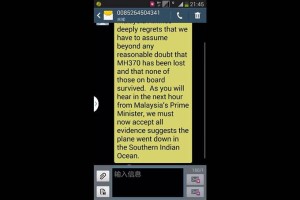If you’re anything like me, since the moment you got word of the missing Malaysian airplane, you’ve been checking for updates every spare second you get. There were times when watching the news felt more like viewing an early episode of Lost; jets that big don’t just disappear. At least part of the mystery came to an end today when the Malaysian Prime Minister announced that authorities are “assuming beyond a reasonable doubt” that the plane went down somewhere in the Southern Indian Ocean. Upon reading this I wondered about the families of those who were on the plane, much like I have since first learning of the incident. Are they relieved to have this answer, even if it wasn’t the one they’d hoped for? In this case, is bad news really better than no news?
As I browsed articles for information, this one in particular, it didn’t take long before I read something with immediate shock value. It’s right there in the first sentence: “The families of passengers aboard the missing Malaysia Airlines jet have been sent text messages telling them that the plane has been ‘lost.'”

Text messages?! Seriously?! These people have been in agony for weeks wondering about the fate of their loved ones, and Malaysia Airlines decides to confirm their worst fears via text message? What kind of callous person could have possibly decided that this was a good idea? Yes, informing the families of 239 passengers is a daunting task, but when it’s a disaster of this magnitude, you’d think they would take the time to do it tactfully. According to one article, most of the family members were still located in Kuala Lumpur waiting for information, and yet they received this text message only minutes before the rest of the world got the news. I couldn’t help but think of some of our discussions in class about how technology has the potential to dehumanize us.
When a loved one dies, the news is typically delivered by word of mouth, whether from a doctor, medical professional, or a closer family member. The person delivering the news is able to offer their sympathy and support and can tailor it to the person they’re telling to make it appropriate and easier if possible. Grief is one of the most basic human emotions and we  rely on sympathetic, responsive human contact to get us through. Witnesses said they heard screaming and and crying coming from rooms where the families were gathered. At least one person is reported to have fainted upon hearing the news. Communicating information through SMS message, while convenient, is not appropriate for a sensitive situation like this. I understand that the business of Malaysia Airlines is transportation, not grief counseling, and that they are likely much more concerned with bigger media matters, but as human beings they should’ve known better. It is clear from these families’ shock that they still held hope that the passengers would be found alive. Delivering what is possibly the worst news of a person’s life via text message goes against the rules of social courtesy and in my opinion shows a real lack of consideration for others’ feelings. In times like this people need to be united by the all too common experience of losing a loved one. A mass text message is a cold replacement for the warm, sympathetic hug each family member would ideally receive.
rely on sympathetic, responsive human contact to get us through. Witnesses said they heard screaming and and crying coming from rooms where the families were gathered. At least one person is reported to have fainted upon hearing the news. Communicating information through SMS message, while convenient, is not appropriate for a sensitive situation like this. I understand that the business of Malaysia Airlines is transportation, not grief counseling, and that they are likely much more concerned with bigger media matters, but as human beings they should’ve known better. It is clear from these families’ shock that they still held hope that the passengers would be found alive. Delivering what is possibly the worst news of a person’s life via text message goes against the rules of social courtesy and in my opinion shows a real lack of consideration for others’ feelings. In times like this people need to be united by the all too common experience of losing a loved one. A mass text message is a cold replacement for the warm, sympathetic hug each family member would ideally receive.

As a bit of an afterthought, while I was still mulling over what I wanted to write, I came across this post on the “Portraits of Boston” Facebook page (for those who don’t know, it’s a photo blog much like Humans of New York). Hearing (or reading, rather) what this man had to say about how disconnected we are as humans solidified for me the problem with the text that was sent to the families of the Malaysia Airlines victims. It furthers our culture of disconnection from one another. We hear about how much technology has brought us together, but the connections it fosters are usually fairly shallow. As the man in the picture said, “people are yearning for deep human connection. When we have it, we identify with the person or people. We better connect to each other or we will become more and more dehumanized.”

I was actually reading about this in a USA TODAY article. It was completely horrifying to read that there was such a disregard for human life and its fragility. (I was actually going to write a blog post about this! Glad I wasn’t the only one who felt this needed to be talked about!) Interestingly enough, Malaysia Airlines defended the text message in a follow-up USA TODAY article: http://www.usatoday.com/story/news/world/2014/03/24/malaysian-airlines-text-message/6825641/
It startles me that although Malaysia Airlines states “that management informed the majority of families in person and by telephone before the prime minister’s announcement,” they would still send a text message “only as an additional means of communicating with families.” I cannot help but group this situation with how military deaths are handled. If a member of the military passes away, officials are sent to the home to be, unfortunately, the bearers of bad news. I have to wonder why the airline company did not use this compassionate procedure.
Everything about this tragedy is heartbreaking!